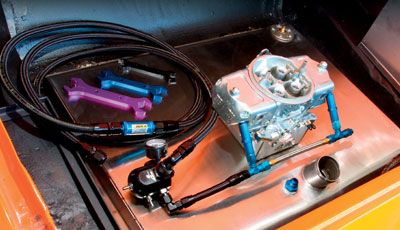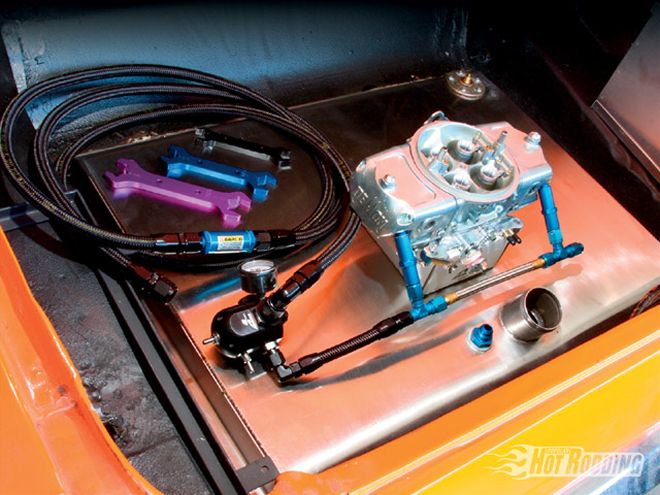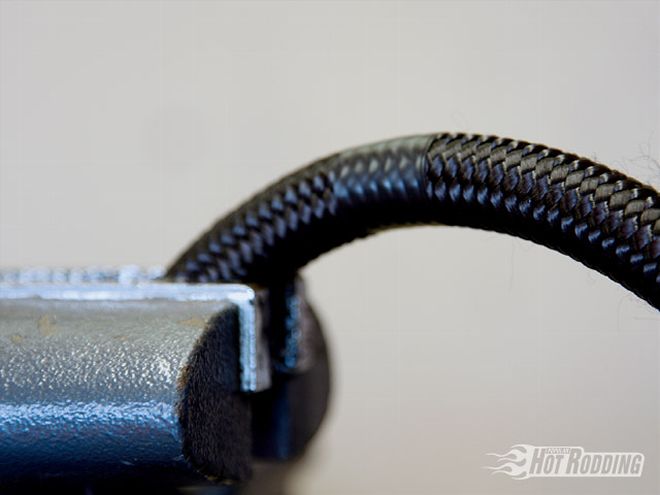

Street Fighter
Every project we tackle on this car gets us one step closer to having it run and drive. It feels like we're inching toward a finish line a mile away but this step is a big one. So far, we've built up the drivetrain and suspension to handle some high-speed road racing and quick-steering autocross action. Now it's time to work out the details.
This month, we're taking aim at the fuel system. The factory stuff isn't up to the task of supplying clean and ample fuel to the thirsty 850 Mighty Demon. The factory fuel tank capacity is 16 gallons, which is plenty for track days and street driving, but our chosen replacement, a bolt-in stainless steel tank from Rick's Tanks, is a generous 23 gallons. The biggest reason for the upgrade is that Rick's tank has built-in baffling that makes it perfect for the twisties of a road course or autocross circuit. Fuel slosh can potentially starve an engine, and that's never a good thing. The new tank also has a built-in electric AC Delco fuel pump that will supply enough fuel for the carbureted Windsor we're running, and even a high-pressure EFI system like on a 5.0L Mustang engine. Unlike most fuel cells, this tank fits in the factory location and follows the body line of the Mustang's underbelly. The top does protrude into the interior of the trunk, but barely cuts down on the storage space. Rick's Tanks delivered a true bolt-in product that is exactly that. Besides trimming the factory filler neck, no modification was needed to install the tank.
From the pump, we chose to use Earl's Pro-Lite 350 hose. It's something we've used before in our project cars. We like it because it's lightweight, black, and really easy to work with. Unlike traditional steel-braided lines, this stuff cuts effortlessly and doesn't fray. Have you ever been cut or stabbed from a stainless line assembly? It's not a problem with the Pro-Lite hose. Its core is a synthetic rubber hose with nylon-braided sheathing that is resistant to abrasion. Pro-Lite is about half the weight of stainless-braided hose with many similarperformance specifications. The pressure maximum is 350 psi, which is much higher than anything this Mustang will ever see. Operating temperatures are extreme too, which is usually true in a race car. This super-clean black hose wouldn't look right without Earl's Ano-Tuff black-anodized aluminum hose ends and adapters.
In line to the regulator we used Earl's screen-type fuel filter that has -8 AN male fittings on either end to make it easy to splice into our main feed line. We used -8 sizing for the feed and return lines to keep ample flow to the regulator and to allow the fuel to return without restriction back to the tank. The pump puts out 40 psi of pressure, so having a high-flow return is important.
Because the pump's output pressure is much higher than necessary for a carbureted application without a controller, we used a return, or bypass-style, regulator. Fuel enters the regulator as the pump's output pressure is reduced for the outlet (carburetor) side, and the excess fuel is returned to the tank. We're using an Aeromotive A1000 carbureted bypass-style pressure regulator that is built just for this type of fuelsystem. It's adjustable between 3 and 15 psi. This particular one is made specifically for marine applications, but is suitable for street and race use. We liked it because it was all black instead of black and silver, or black and red, like their other versions of the same regulator. The marine version carries extra certifications that raise its price from the others, but it sure looks sharp.
The last run of Pro-Lite goes from the regulator to the carburetor inlet line. The regulator has two carburetor outlets so you can feed each bowl separately, but we wanted a single inlet into the Barry Grant's braided -6 fuel line.
In any system, whether it's cooling, wiring, braking, or plumbing, it's always good to go a little bigger or better than what you expect to need. The price difference is marginal to upgrade when you are initially building, but it's extreme when you have to start replacing stuff. That's why we're using really high-quality parts and high-flow lines and fittings to make sure we don't have any fuel starvation problems down the road.
PROJECT STREET FIGHTER The first step is to mark the length of hose you will be using. Keep in mind where in the fitting the hose ends for better accuracy. Wrap electrical tape around the hose with the mark in the center of the tape.
The first step is to mark the length of hose you will be using. Keep in mind where in the fitting the hose ends for better accuracy. Wrap electrical tape around the hose with the mark in the center of the tape.
Assembling The Hoses
Instead of using hard line or regular rubber hose, we used Earl's Pro-Lite 350 hose. This stuff is really easy to work with and it's very pliable for routing. Though not required, there are some special tools that help make assembly much easier. We used Earl's aluminum vise jaw liners, Earl's aluminum -AN wrenches, electrical tape, and a cutoff wheel.